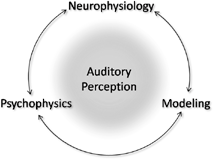Research Overview
Our lab studies how the brain processes sound in normal and impaired auditory health.
The overarching goals of our research are to:
- Understand the neural processes underlying perception of sounds from simple stimuli such as tones to complex stimuli such as speech and music
- Understand the anatomical and physiological factors that contribute to perceptual deficits experienced by listeners with hearing impairment
- Identify noninvasive neurophysiological biomarkers for translating findings from animal models to humans and improve clinical diagnostics
We specialize in using animal modeling to further understand human hearing loss, and have accomplished this using a multidisciplinary approach with our experts in:
- Animal (chinchilla lanigera) and human behavioral experiments
- Invasive neuronal recordings from deep brain structures
- Noninvasive electroencephalography (EEG) and ear-canal recordings
- Anatomical Labeling
- Computational Modeling
These methods, in addition to our close collaborations with SNAPLab, the MD Steer Audiology Clinic at Purdue, and the Training Program in Auditory Neuroscience (TPAN), help us coordinate animal and human studies that synergistically bridge the gap between the anatomical, physiological, and perceptual effects of sensorineural hearing loss.

